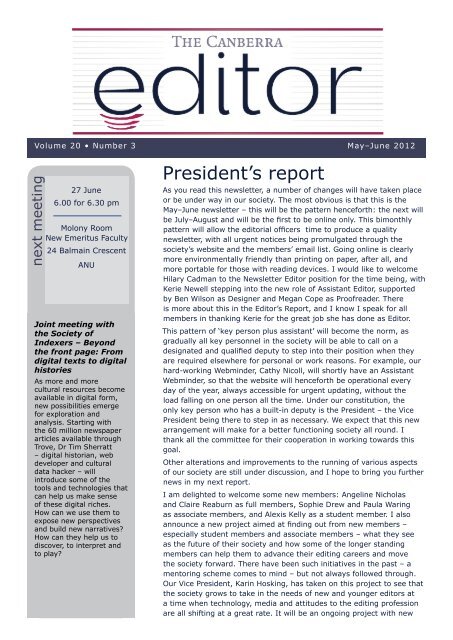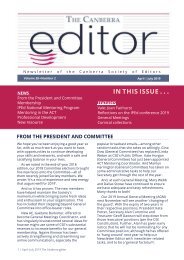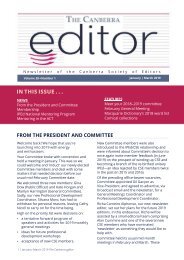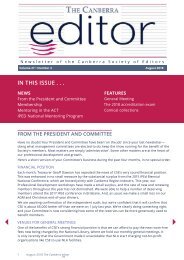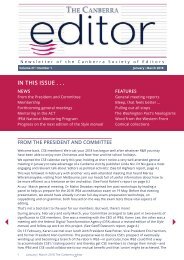The Canberra editor May-June 2012
Newsletter of the Canberra Society of Editors
Newsletter of the Canberra Society of Editors
Create successful ePaper yourself
Turn your PDF publications into a flip-book with our unique Google optimized e-Paper software.
Volume 20 19 • Number 3 9 <strong>May</strong>–<strong>June</strong> <strong>June</strong> <strong>2012</strong><br />
next meeting<br />
27 <strong>June</strong><br />
6.00 for 6.30 pm<br />
Molony Room<br />
New Emeritus Faculty<br />
24 Balmain Crescent<br />
ANU<br />
Joint meeting with<br />
the Society of<br />
Indexers – Beyond<br />
the front page: From<br />
digital texts to digital<br />
histories<br />
As more and more<br />
cultural resources become<br />
available in digital form,<br />
new possibilities emerge<br />
for exploration and<br />
analysis. Starting with<br />
the 60 million newspaper<br />
articles available through<br />
Trove, Dr Tim Sherratt<br />
– digital historian, web<br />
developer and cultural<br />
data hacker – will<br />
introduce some of the<br />
tools and technologies that<br />
can help us make sense<br />
of these digital riches.<br />
How can we use them to<br />
expose new perspectives<br />
and build new narratives?<br />
How can they help us to<br />
discover, to interpret and<br />
to play?<br />
President’s report<br />
As you read this newsletter, a number of changes will have taken place<br />
or be under way in our society. <strong>The</strong> most obvious is that this is the<br />
<strong>May</strong>–<strong>June</strong> newsletter – this will be the pattern henceforth: the next will<br />
be July–August and will be the first to be online only. This bimonthly<br />
pattern will allow the <strong>editor</strong>ial officers time to produce a quality<br />
newsletter, with all urgent notices being promulgated through the<br />
society’s website and the members’ email list. Going online is clearly<br />
more environmentally friendly than printing on paper, after all, and<br />
more portable for those with reading devices. I would like to welcome<br />
Hilary Cadman to the Newsletter Editor position for the time being, with<br />
Kerie Newell stepping into the new role of Assistant Editor, supported<br />
by Ben Wilson as Designer and Megan Cope as Proofreader. <strong>The</strong>re<br />
is more about this in the Editor’s Report, and I know I speak for all<br />
members in thanking Kerie for the great job she has done as Editor.<br />
This pattern of ‘key person plus assistant’ will become the norm, as<br />
gradually all key personnel in the society will be able to call on a<br />
designated and qualified deputy to step into their position when they<br />
are required elsewhere for personal or work reasons. For example, our<br />
hard-working Webminder, Cathy Nicoll, will shortly have an Assistant<br />
Webminder, so that the website will henceforth be operational every<br />
day of the year, always accessible for urgent updating, without the<br />
load falling on one person all the time. Under our constitution, the<br />
only key person who has a built-in deputy is the President – the Vice<br />
President being there to step in as necessary. We expect that this new<br />
arrangement will make for a better functioning society all round. I<br />
thank all the committee for their cooperation in working towards this<br />
goal.<br />
Other alterations and improvements to the running of various aspects<br />
of our society are still under discussion, and I hope to bring you further<br />
news in my next report.<br />
I am delighted to welcome some new members: Angeline Nicholas<br />
and Claire Reaburn as full members, Sophie Drew and Paula Waring<br />
as associate members, and Alexis Kelly as a student member. I also<br />
announce a new project aimed at finding out from new members –<br />
especially student members and associate members – what they see<br />
as the future of their society and how some of the longer standing<br />
members can help them to advance their editing careers and move<br />
the society forward. <strong>The</strong>re have been such initiatives in the past – a<br />
mentoring scheme comes to mind – but not always followed through.<br />
Our Vice President, Karin Hosking, has taken on this project to see that<br />
the society grows to take in the needs of new and younger <strong>editor</strong>s at<br />
a time when technology, media and attitudes to the editing profession<br />
are all shifting at a great rate. It will be an ongoing project with new
Your committee<br />
President<br />
Elizabeth Manning Murphy<br />
0428 866 722<br />
emmurphy@ozemail.com.au<br />
Vice-President<br />
Karen Hosking<br />
chezkaz@gmail.com<br />
Secretary<br />
Martin Holmes 0431 268 948<br />
Martin.Holmes-Forte@bigpond.<br />
com<br />
Treasurer<br />
Tracy Harwood 0402 627 530<br />
tracyharwood@grapevine.net.<br />
au<br />
Training Coordinator<br />
Connie Stamos<br />
connie.stamos@gmail.com<br />
Membership Secretary<br />
Margaret Millard<br />
margaret.millard@ozemail.<br />
com.au<br />
Newsletter<br />
Editor: Hilary Cadman<br />
0419 276 110<br />
hilary@cadmanediting.com<br />
Assistant Editor: Kerie Newell<br />
0412 042 974<br />
kerie.newell@bigpond.com<br />
Designer: Ben Wilson<br />
Proofreader: Megan Cope<br />
Meeting Coordinator<br />
Ara Nalbandian<br />
yerevanarax7@hotmail.com<br />
IPEd Delegate<br />
Cathy Nicoll<br />
6259 2984<br />
Cathy.Nicoll@atrax.com.au<br />
IPEd Accreditation<br />
Delegate<br />
Ted Briggs<br />
6161 4924<br />
0407 018 433<br />
tedbriggs@grapevine.com.au<br />
Committee members<br />
Helen Topor<br />
Emma Field<br />
Leanne Pattison<br />
Non-committee positions<br />
Catering Coordinator<br />
Vacant<br />
Public Officer<br />
Ara Nalbandian<br />
Webminder<br />
Cathy Nicoll<br />
2 <strong>The</strong> <strong>Canberra</strong> <strong>editor</strong><br />
members being canvassed for their views and encouraged to be<br />
involved in any way that they wish. <strong>The</strong> future is yours.<br />
Please watch your emails from now on, and the website, for<br />
announcements of all kinds – training for <strong>2012</strong> is well under way<br />
thanks to Connie Stamos, our Training Coordinator; you will by now<br />
know of a change in our meeting room arrangements; and much<br />
more.<br />
As you read this, I will be in South Africa to run seminars for <strong>editor</strong>s<br />
in Cape Town and Johannesburg and to attend the launch of a South<br />
African printing of the society’s publication Working Words at the<br />
Cape Town Book Fair. I will be carrying with me greetings from our<br />
society to our colleagues in the Professional Editors Group in South<br />
Africa, and I look forward to reporting back to you in the July–August<br />
newsletter.<br />
Elizabeth Manning Murphy DE<br />
What is XML, anyway?<br />
Exploring XML publishing technologies<br />
XML is occasionally mentioned in the literature and media about<br />
digital publishing, but because those discussions are usually about<br />
the business of digital publishing, there is little explanation of what it<br />
means in a production sense. In this article, Dave Gardiner presents<br />
an overview of the most relevant XML technologies for editing and<br />
publishing.<br />
<strong>The</strong> ‘really big’ picture of XML technologies<br />
What is XML? That’s a really big question, because XML is a really big<br />
technology. First, XML is the abbreviated form of eXtensible Markup<br />
Language. XML comes in many different varieties and is used for a<br />
vast range of computing applications – it is not just for publishing. It<br />
might help to put things in context with a brief potted history.<br />
In the mid–1980s, the standard generalised markup language (SGML)<br />
was adopted as a standard language to format documents that could<br />
be read by computing systems; you still see the acronym SGML in a<br />
few publishing job advertisements, because it was the basis of the<br />
very first digital production systems that publishers implemented.<br />
XML developed as an offshoot of SGML from the early 1990s, with<br />
one of the earliest XML languages being DocBook. Around the same<br />
time, hypertext markup language (HTML) was developed, also an<br />
offshoot of SGML. Both HTML and XML share similar characteristics in<br />
how they are structured, such as the use of opening and closing ‘tags’<br />
to define certain types of content.<br />
XML has since developed into hundreds of languages designed to<br />
handle different types of data and content for applications, such as<br />
displaying content in web browsers, transferring content between<br />
databases and publishing documents for many technical, scientific<br />
and business professions and fields of endeavour – each with their<br />
own specific requirements for how they manage their information.<br />
Tech-savvy <strong>editor</strong>s would be familiar with XML-based languages such<br />
as really simple syndication (RSS) used to format news feeds on the<br />
web, extensible hypertext markup language (XHTML) for web design<br />
and word processing formats such as DOCX used in Microsoft Word.
XML for publishing<br />
<strong>The</strong> most relevant XML technologies for editing and publishing currently cover XML schemas<br />
(different languages used to format content using markup, or tags) and XSLT stylesheets (which<br />
produce output documents from XML markup). In the realm of stylesheets, other XML languages<br />
include XSL-FO (specifically to produce PDF documents). <strong>The</strong>re is also scalable vector graphics<br />
(SVG), which is used to produce vector-based illustrations; SVG illustrations can be displayed in most<br />
browsers.<br />
It might make sense to show how these publishing technologies relate to each other and fit in the<br />
overall ‘big picture’ of XML. <strong>The</strong> figure to the left shows at the top the XML 1.0 specification that<br />
has been adopted by the World Wide Web Consortium (W3C) as defining the rules for how XML<br />
languages should be structured and how they<br />
should function when used on the web. This<br />
standard is what XML developers follow when<br />
defining their own specific XML schemas. Below<br />
that is a hierarchical layout showing, more or<br />
less, how the main XML publishing technologies<br />
relate to one another.<br />
CSE training news<br />
Read the rest of this article at http://tinyurl.com/<br />
bqk3utv. Got a question? Post it at http://tinyurl.<br />
com/7yqk4q8.<br />
Dave Gardiner<br />
Hi, I am Connie Stamos, the new Training Coordinator for the <strong>Canberra</strong> Society of Editors. I’m<br />
delighted to be with the Society this year and I’ve worked hard to round up some ‘juicy’ professional<br />
workshops for you in coming months.<br />
Completed courses<br />
We have already held two workshops in <strong>2012</strong> with ‘rave reviews’:<br />
y Multiple Platforms with Minimal Editing, David Whitbread, on 12 <strong>May</strong><br />
y Manuscript Assessment for Writers and Editors, Pam Hewitt, on 19 <strong>May</strong>.<br />
Future courses<br />
Three further workshops will definitely be going ahead:<br />
y Style and Template Essentials in Word 2010 (half-day workshop, 21 July)<br />
This workshop – a must for all <strong>editor</strong>s – will be run by Brian O’Donnell. Brian is a CSE member who<br />
works at the Department of Defence as a writer, <strong>editor</strong> and Word template developer. In previous<br />
jobs, Brian worked in a variety of roles, including as a staff trainer and an IT trainer.<br />
y Grammar in a Nutshell (half-day workshop, 25 November)<br />
Elizabeth Manning Murphy, the author of Working Words and current CSE President, will present this<br />
course on the essentials of grammar and the conventions used to make text acceptable. Don’t miss<br />
this November workshop.<br />
y IPEd accreditation exam workshop (two Saturday afternoon workshops in August, dates to be<br />
confirmed)<br />
I am so excited that Malini Devadas (Biotext) is all set to deliver our IPEd accreditation sessions in<br />
August, just in time for the October exam. Malini gave me a few of her insights into the exam and I’d<br />
love her to share those with you. So, whether you plan to sit the exam, or want to do the workshop<br />
simply to keep your professional toolbox up-to-date, please send me your expression of interest as<br />
soon as possible.<br />
More details about these workshops are available on the CSE website: www.<strong>editor</strong>scanberra.org/.<br />
<strong>May</strong>–<strong>June</strong> <strong>2012</strong> 3
Web accessibility awareness is in focus this year at CSE in view of the W3C Web Design and Accessibility<br />
Standards, and the Australian government requirements for web accessibility (Phase 3 to be complete by<br />
Dec <strong>2012</strong>). We will soon provide links to training delivered by organisations such as Vision Australia, who are<br />
in the forefront of accessibility training, so please keep an eye out for the new links on our website.<br />
Finally, if you have any other training ideas or needs, please drop me a line. You can also send details of<br />
editing courses that you are aware of in and around <strong>Canberra</strong> that we can share with CSE members and<br />
friends. I appreciate your help and look forward to hearing from you!<br />
Connie Stamos<br />
IPEd notes<br />
News from the Institute of Professional Editors Limited, March–April <strong>2012</strong><br />
<strong>The</strong> IPEd Council met twice during the period covered by these notes, on 4 and 31 March. Both meetings<br />
were by teleconference.<br />
Barbara Ramsden Award<br />
<strong>The</strong> Barbara Ramsden Award for excellence in editing is a major literary prize for a book in any field of<br />
literature. <strong>The</strong> award, a joint activity of the Fellowship of Australian Writers (FAW) and IPEd, acknowledges<br />
the contribution of the author–<strong>editor</strong> partnership to the creation of a final work of the highest quality.<br />
<strong>The</strong> 2011 award winner – a book celebrating Captain William Bligh’s extraordinary small-boat journey from<br />
Tofua to Timor after the mutiny on the Bounty – was announced at a ceremony on 30 March. In Bligh’s<br />
hand: surviving the mutiny on the Bounty, published by the National Library of Australia (NLA), brings to life<br />
Bligh’s notebook, meticulously kept during the 47-day, 6,700-km voyage of the 7-metre open boat, during<br />
which only one of the 19 men aboard died. Dr Jennifer Gall wrote and Joanna Karmel edited In Bligh’s hand,<br />
which, in both words and facsimile illustrations, celebrates the notebook, now held as one of the treasures of<br />
the NLA.<br />
IPEd’s judges for the award wrote:<br />
This is a beautiful and comprehensive book, which shows clear evidence of Joanna Karmel’s hand in project managing<br />
a complex production that would have required extensive consultation with a range of contributors in addition to the<br />
author. <strong>The</strong> finished work complements the text in every way possible through illustrations, additional explanations<br />
and a helpful index, all managed and cross-referenced by the <strong>editor</strong>.<br />
Jennifer Gall’s text itself is clear, accessible, interesting, informative and illuminating. <strong>The</strong> author’s style<br />
makes the book a real page turner. Background information is provided unobtrusively, usefully and valuably.<br />
No copyediting or proofreading infelicities mar the reader’s interaction with the text.<br />
For the author and <strong>editor</strong> of the winning book, sponsership from FAW and IPEd furnishes two specially cast<br />
bronze plaques designed by sculptor and medallionist Michael Meszaros.<br />
4 <strong>The</strong> <strong>Canberra</strong> <strong>editor</strong><br />
Looking for the latest insights into editing, both on screen and in print?<br />
Let us know what you’d like to learn this year and we’ll use your feedback<br />
to plan the brand new <strong>2012</strong> CSE Training courses.<br />
Send your requests or suggestions to:<br />
Connie Stamos, CSE Training Coordinator, at conniestamos@gmail.com.
<strong>The</strong> IPEd Prize<br />
As part of its broader mission to advance the profession, IPEd seeks to support and foster research<br />
in editing and publishing. To that end, it is sponsoring an annual prize of $250 for an essay or<br />
paper written as part of the requirements for a postgraduate degree in editing, publishing or other<br />
discipline that permits a focus on editing. <strong>The</strong> IPEd website gives full details of the submission<br />
requirements for the prize, notice of which has been sent to postgraduate course coordinators.<br />
Professional development register<br />
Thanks to the efforts of Rosemary Noble and colleagues in the Society of Editors (Victoria), a register<br />
of all professional development sessions and training workshops held by IPEd’s member societies<br />
over the past three years is now available on the members-only section of the website. <strong>The</strong> societies<br />
are encouraged to consult the register to explore how they might expand the range of professional<br />
development services they provide. Societies that wish to provide for their members activities that<br />
would involve interstate travel by a specific trainer can apply to IPEd for funding support; your IPEd<br />
Councillor can advise on this. Societies can also use the register to identify and contact trainers<br />
whom they might wish to invite to their society.<br />
IPEd Secretary’s position to be advertised<br />
<strong>The</strong> current Company Secretary will be retiring later in the year and IPEd has begun the search for<br />
a successor. In the first instance, expressions of interest are being sought from the members of the<br />
societies of <strong>editor</strong>s, through an advertisement placed in their newsletters, on their websites and via<br />
society emailing lists. This will be done during <strong>May</strong>; keep an eye out for the advertisement if you are<br />
interested in the position.<br />
PR person sought<br />
<strong>The</strong> IPEd Council feels certain that among the ranks of society members there are <strong>editor</strong>s who also<br />
have skills and experience in PR and promotion, and would be willing to exercise them for the benefit<br />
of the profession; it seeks a volunteer from among such. <strong>The</strong>ir initial task will be to promote the<br />
need for <strong>editor</strong>s to the public and corporate sectors. While no payment can be offered, there is a<br />
small monthly budget to support activities associated with the task. Interested parties should contact<br />
Rosemary Luke, Council Chair, via the ‘Contact us’ link on the IPEd website: http://iped-<strong>editor</strong>s.org/<br />
Contact_Us.aspx.<br />
Policy on privacy<br />
At its meeting on 31 March, the IPEd Council endorsed a new privacy policy on use of personal<br />
information. This policy defines how and for what purposes IPEd will make use of personal<br />
information provided by:<br />
y its members (i.e. the societies of <strong>editor</strong>s) about their members<br />
y accreditation exam candidates.<br />
<strong>The</strong> full policy statement can be read on the IPEd website.<br />
2013 National Conference<br />
<strong>The</strong> Society of Editors (WA) is busily organising the 6th National Editors Conference – Editing across<br />
borders – to be held in WA on 10–13 April 2013. Mark your diary. <strong>The</strong> venue (<strong>The</strong> Esplanade Hotel,<br />
Fremantle) has been booked, and the search is on for inspiring topics and dynamic speakers. For all<br />
conference details, go to http://marisa.com.au/conference/.<br />
<strong>The</strong> Society of Editors (SA) has generously granted its WA colleagues a loan of $5,000 to help cover<br />
upfront costs of organising the conference.<br />
Ed Highley, IPEd Secretary<br />
ipedsecretary@gmail.com<br />
<strong>May</strong>–<strong>June</strong> <strong>2012</strong> 5
Promoting Working Words<br />
… or, I’ve never done this before, so please buy this book – it’s good<br />
… like Fowler, or Partridge or Gowers, will give pleasure and satisfaction even to the already literate.<br />
<strong>The</strong> blessed Jack Waterford gave us these words of gold (<strong>Canberra</strong> Times, 20 February <strong>2012</strong>). So<br />
concise, so laudatory. So quotable.<br />
‘Pleasure and satisfaction’; he fingered the twin urges of our times. <strong>The</strong> first three bookshop sales<br />
were the next day (Yes, Jack, please keep the review copy).<br />
As Paperchain’s manager said when explaining book retail rules to this marketing virgin touting her<br />
wares: ‘You’ve got to have publicity’.<br />
‘Yes, we’re trying, we’re trying,’ I said, desperately agreeing and trying to Think Big. ‘So, could you<br />
put up this A4 poster somewhere?’<br />
Where to start? It’s not like we’re Dan Brown, with culture-shattering, epochal paradigms secreted<br />
in the distracting gerund of a dangling modifier. <strong>May</strong>be a GrammaFest stall on <strong>Canberra</strong> Day; a<br />
Punctuation Princess float; Parts-of-Speech Lotto. We could do an ‘Adverb or Preposition? Test Your<br />
Skill’. That should be a goer.<br />
No. Identify target audiences.<br />
Cathy Nicoll, Kerie Newell and I (the promotions committee) made a long list of these and other<br />
potential outlets after money from the 64 copies sold at the book’s launch in September 2011<br />
trickled back into the Society’s purse.<br />
Broadly, they included people who’d buy (tertiary institutions writing and editing courses, public<br />
service, other societies of <strong>editor</strong>s); people who’d sell (retail outlets, as the CSE couldn’t handle<br />
the hoped-for megasales, and this isn’t a street-corner proposition) and people who’d publicise<br />
(reviewers, interviewers, town criers). Plus the unquantifiable assistance of Mr WordofMouth, whose<br />
progress was initially fuelled by the large number of single copies hawked by individuals, mainly the<br />
author, Elizabeth Manning Murphy.<br />
We needed to have Working Words ready in shops when good reviews appeared and university<br />
lecturers listed it for their courses, but shops were reluctant to stock it until the reviews and<br />
lecturers … Well, Paperchain in Manuka broke the Catch-22, took six copies ‘on consignment’<br />
(meaning they pay us only if they sell, I learnt), put up our display poster and blurb, and gave<br />
helpful advice. <strong>The</strong>y sold the six, paid promptly and ordered more. <strong>The</strong>ir advice included acquainting<br />
us with Nielsen Book Data, an international, online organisation which we had to have the book’s<br />
details on and to which all Oz retailers refer. Viva Paperchain!<br />
We decided to stay local at first (Yes, we deliver!). <strong>The</strong> tangential placement of six copies at<br />
Readings, a Melbourne outpost, happened just because I was there at Christmas. <strong>The</strong>y’ve sold four<br />
since Kerie notified the Victorian Society of Editors of the supply (OK, one was to my mother).<br />
Dr Paul Hetherington (University of <strong>Canberra</strong>) accepted a copy to evaluate, loved it, bought it! And<br />
he put it on the recommended reading list for his editing course. That meant the Co-op Bookshop at<br />
University of <strong>Canberra</strong> would stock it (a cautious five copies) and, once they entered its details on<br />
their database, ANU Co-op also agreed to stock it (also five copies). <strong>The</strong>y bought them outright, too,<br />
not on consignment (though it takes the Co-op finance people in Sydney eight weeks to walk here<br />
with the money, poor things).<br />
As well, Dr Paul gave us a paragraph of academically toned compliments – very quotable – to<br />
start the pot of praise on the CSE website. Other favourable reviews have been in <strong>Canberra</strong>’s BMA<br />
magazine, ANU’s Emeritus and the UK’s Editing Matters, these contacts indicating the cultural and<br />
geographic reach of Elizabeth’s network, not the committee’s.<br />
We trust that CIT and ANU’s Centre for Continuing Education will welcome our imminent advances.<br />
Further away, Pam Peters said she’d ‘find a niche’ for Working Words in one of Macquarie’s courses.<br />
Such courses seem the best long-term bet.<br />
Meanwhile, back in South Africa … Elizabeth had met Isabelle Delvare, the president of its<br />
Professional Editors’ Group (PEG) when in England last year. Isabelle later wrote an enthusiastic<br />
6 <strong>The</strong> <strong>Canberra</strong> <strong>editor</strong>
eview of Working Words (you can see it online in their neatly titled newsletter PEGboard and on our<br />
website), and they agreed that a lecture and workshop tour in South Africa in <strong>June</strong> would benefit<br />
both PEG and us. <strong>The</strong> problem of getting lots of books there (high cost of postage, import duties<br />
and sales tax), or the undignified picture of Elizabeth convincing Customs that, yes, these 150 books<br />
in my suitcase are all gifts – has been solved by Cathy and Isabelle organising print-on-demand in<br />
South Africa.<br />
ABC 666’s Genevieve Jacobs, on the Big Ideas series in her Afternoons program (12 March), quizzed<br />
Elizabeth about grammar’s identity and place in the meaning of life, and plugged Working Words as<br />
‘bracing’, connoting rigour and refreshment.<br />
More sales and in late April Dymocks, besieged by demands, rang us, out of the blue, seeking five<br />
copies.<br />
We’re approaching 50 through bookshops – not exactly a Black Caviar sprint, but this book is more of<br />
a Phar Lap stayer. At the end of April the total number sold, including at conferences, was 217.<br />
Go, good ol’ Mr WordofMouth, master of momentum.<br />
Leanne Pattison<br />
From the <strong>editor</strong><br />
Change of roles<br />
We’ve made a few changes in the newsletter team. Kerie Newell, who has put in an enormous<br />
amount of work over the past couple of years as newsletter <strong>editor</strong>, has offered to take on the job<br />
of assistant <strong>editor</strong>. I have moved from newsletter designer to <strong>editor</strong> (at least till August), and Ben<br />
Wilson has taken over the design. Megan Cope will continue to proofread the newsletter.<br />
Other changes are the switch from a monthly newsletter to a bimonthly one, (starting with this <strong>May</strong>–<br />
<strong>June</strong> edition), and from print and web versions to a web version only. We will continue to include a<br />
write up of recent meetings in the newsletter, but members will need to go online to find information<br />
about the topics of upcoming meetings. <strong>The</strong> website will also have a list of deadlines for submissions<br />
to the newsletter.<br />
I’m looking forward to working with Kerie, Ben and Megan on the newsletter.<br />
Hilary Cadman<br />
Committee positions becoming vacant<br />
All positions become vacant at the annual general meeting, and can be contested if there is more<br />
than one applicant for the same position<br />
y President – Elizabeth Murphy took on this role as a temporary measure, and will be standing down<br />
at the end of August.<br />
y Vice-President – Karin Hosking took on this role as a temporary measure, and will be standing down<br />
at the end of August.<br />
y Treasurer – Tracy Harwood’s two-year term ends this year. <strong>The</strong> constitution requires her to step<br />
down.<br />
y Newsletter Editor – Hilary Cadman took on this role as a temporary measure, and will be standing<br />
down at the end of August.<br />
y Assistant Editor – Kerie Newell took on this role as a temporary measure, and will be standing down<br />
at the end of August.<br />
y Catering Coordinator – vacant.<br />
General committee members are always welcome.<br />
<strong>May</strong>–<strong>June</strong> <strong>2012</strong> 7
Membership renewal for <strong>2012</strong>–13<br />
It’s membership renewal time again!<br />
All memberships expire on 30 <strong>June</strong> so please renew before the end of July to remain financial.<br />
It’s an easy two-step process:<br />
1. Fill in the short online form so that we have your up-to-date details: http://tinyurl.com/d6ccp6c.<br />
2. Make your payment by following the instructions here: http://tinyurl.com/d2pf9sq.<br />
<strong>The</strong> fees for <strong>2012</strong>–13 are $85 for full members, $70 for associates, $30 for students and $225 for corporate<br />
members.<br />
<strong>The</strong> society prefers payment by direct deposit if possible (that is, by electronic funds transfer (EFT) or<br />
personally depositing money at your local Community CPS branch). This is quicker, more efficient and less<br />
costly than handling cheques. Of course, payments by cheque or money order are still acceptable.<br />
Please contact the treasurer, Tracy Harwood (tracyharwood@grapevine.net.au), if you have any questions<br />
about renewal payments.<br />
Contents<br />
President’s report . . . . . . . . . . . . . 1<br />
What is XML, anyway? . . . . . . . . . . 2<br />
CSE training news . . . . . . . . . . . . .3<br />
IPEd notes . . . . . . . . . . . . . . . . . . 4<br />
Promoting Working Words. . . . . . . .6<br />
From the <strong>editor</strong> . . . . . . . . . . . . . . . 7<br />
Committee positions. . . . . . . . . . . . 7<br />
Membership renewal . . . . . . . . . . .8<br />
If undeliverable, please return to:<br />
<strong>Canberra</strong> Society of<br />
Editors<br />
PO Box 3222,<br />
Manuka ACT 2603<br />
Print Post approved<br />
PP 299436/00098<br />
<strong>The</strong> <strong>Canberra</strong> <strong>editor</strong><br />
Published by the <strong>Canberra</strong> Society of Editors<br />
PO Box 3222 Manuka ACT 2603<br />
21st 20th year, number 32<br />
© <strong>Canberra</strong> Society of Editors <strong>2012</strong> 2011<br />
ISSN 1039-3358 (Print) 2200-6344 (Online)<br />
Opinions and statements in signed articles are those of<br />
the author.<br />
Newsletter schedule<br />
<strong>The</strong> next newsletter will appear in August <strong>June</strong> 2011 <strong>2012</strong>. and <strong>The</strong> for<br />
copy that issue deadline the is copy 15 deadline July <strong>2012</strong>. is 28 <strong>May</strong>.<br />
<strong>The</strong> <strong>editor</strong> welcomes contributions by email: email to:<br />
.<br />
hilary@cadmanediting.com.<br />
All articles must be in .doc format.<br />
SURFACE<br />
MAIL<br />
POSTAGE<br />
PAID<br />
AUSTRALIA


